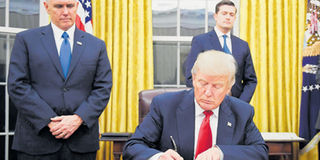Analysts caution TZ to tread carefully with Trump

US President Donald Trump signs an executive order as Vice President Mike Pence looks on at the White House in Washington, DC on Friday. PHOTO | AFP
What you need to know:
- Mr Trump’s inward-looking ‘America first’ vow on Friday, described by many as nationalist and protectionist, has renewed concerns around the globe that his administration could be difficult to work with.
- In no uncertain terms, the new US president said the time when his nation made sacrifices for the world was over.
Dar es Salaam. While Tanzania should not worry much about the hard stance expressed by the 45th US President Donald Trump in his inauguration speech, there is still a need for caution going forward, on how it engages the superpower in economic and development policies, analysts have said.
Mr Trump’s inward-looking ‘America first’ vow on Friday, described by many as nationalist and protectionist, has renewed concerns around the globe that his administration could be difficult to work with.
In no uncertain terms, the new US president said the time when his nation made sacrifices for the world was over.
“For many decades, we’ve enriched foreign industry at the expense of American industry; subsidised the armies of other countries while allowing for the very sad depletion of our military; we’ve defended other nation’s borders while refusing to defend our own; and spent trillions and trillions of dollars overseas while America’s infrastructure has fallen into disrepair and decay,” he said.
“From this moment on, it’s going to be only America First. America First.Every decision on trade, on taxes, on immigration, on foreign affairs, will be made to benefit American workers and American families.”
But reacting to the speech, Tanzanian analysts told The Citizen yesterday that they were not expecting any radical and overnight changes in relations with the US.
However, they were quick to caution that gradually, security and development programmes such as Power Africa and the African Growth and Opportunity Act (Agoa), which has since been renewed to 2025, would be affected. Tanzania is a partner of the US in both.
Dr Benson Bana, a senior political science lecturer at the University of Dar es Salaam, said Mr Trump made “many radical statements” which had started to worry Europe and Africa in general.
He bets the Trump administration will most likely close the US military bases in Africa as one of its cost cutting measures on military funding.
“This will have tremendous impact on the war against terror,” said the UDSM lecturer. “But he cannot undo the institutional framework which has guided US-Africa relations.”
A lecturer at Tumaini University, Ms Rachel Yusuph, warned that Africa’s sense of entitlement to benefitting from the United States would suffer. But she is of the opinion that it would also be a blessing in disguise.
She said: “Trump has declared his intention to put American interests first, that means chances of African countries benefitting from his government have narrowed.”
“The way forward is to strengthen good governance in our institutions and become more attractive to superpowers seeking mutually beneficial partnerships. This is the only way to go to comply with America’s new legacy,” she added.
Mr Julius Mtatiro, a social and political analyst, remains optimistic despite the new US president’s tonally protectionist utterances.
“The US foreign policy wouldn’t change that much, but what Mr Trump has said should serve as a wake up call; the government should start looking for alternatives and other opportunities, instead of relying on aid and grants,” he said.
Mr Mtatiro noted that Mr Trump’s radicalism could be a good thing for countries like Tanzania, which are generally said to be poor. “It will help poor nations to eventually stand on their own feet,” he said.
A communications lecturer at the St Augustine University of Tanzania, Mr Leopold Katubayemwo, said it would only take a complete overhaul of US foreign policy for countries like Tanzania to suffer as a result of American protectionism.
“Any bid to change the US foreign policy will take time to achieve. But that should not cause us to be complacent.
Our government should continue to maintain cordial relations with the US, but at the same time, because the new leader has indicated that assisting foreign nations is not his priority, we should get prepared to live without a helping hand from US,” he said.
Mr Katubayemwo noted that Tanzania’s industrialisation drive and its decision to finance its own projects using internal sources of funds would help reduce the county’s donor dependency.
“We have seen our President John Magufuli trying to make Tanzania economically independent by fighting corruption and emphasising hard work. This is a positive move that will help the country finance its own projects,” he said.
A UDSM political science and public administration assistant lecturer, Mr Elijah Kondi, cautioned that Mr Trump would relate with the outside as “a real capitalist”.




